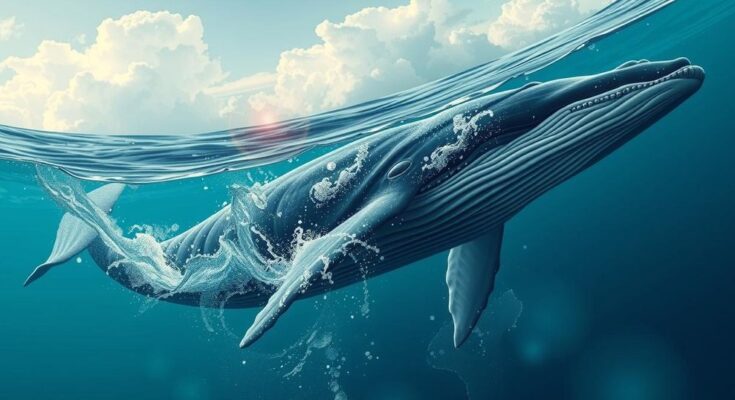A male humpback whale made history by completing an over 8,000-mile migration, raising concerns about the impact of climate change on marine life. Starting in Colombia and reaching Zanzibar, this journey highlights potential environmental adaptations due to rising ocean temperatures affecting krill populations, prompting scientists to investigate the underlying factors driving such extensive migration.
Recently, a male humpback whale completed a record migration of over 8,000 miles (approximately 13,000 km), traversing multiple oceans. This remarkable journey, which began in 2017 off the coast of Colombia and culminated near Zanzibar in 2022, has captured the attention of marine scientists. This event potentially highlights the impact of climate change on these majestic creatures, suggesting their behaviors are adapting in response to environmental alterations.
Initially sighted in Colombian waters in 2017, the whale was closely monitored over the years. Its unprecedented journey to the Indian Ocean raises questions about its motivations. Notably, Ekaterina Kalashnikova, a researcher with the Tanzanian Cetacean Program, remarked that this migration is “really impressive and unusual, even for this highly migratory species.” This long-distance travel may be driven by shifts in feeding grounds resulting from changing environmental conditions.
The traditional diet of humpback whales consists primarily of krill. However, recent research indicates that rising ocean temperatures may be disrupting krill populations, prompting whales to explore new feeding areas. Several theories are hypothesized regarding this migration: seeking out diminishing food sources, looking for new breeding habitats as populations recover, or altering migratory paths due to increased competition among males.
The migratory adjustments of humpback whales directly correlate with rapidly changing climatic conditions. Known for their extensive seasonal migrations between breeding and feeding waters, these whales are reportedly altering their patterns to cope with the decreasing availability of krill, a primary food source. The changing marine environment is indicative of broader shifts within ocean ecosystems, triggered by climate change and resulting in less productive feeding regions.
Several factors associated with climate change are influencing these migratory changes, including: the warming of ocean waters leading to habitat alterations, the necessity of finding food drives changes in migratory behavior, and the effects of extreme climate events disrupting traditional routes. Moreover, similar behavioral adaptations have been observed in other cetaceans as they navigate increasingly challenging conditions, reflecting a concerning trend.
Dr. Kalashnikova emphasized that while the precise reasons remain unclear, global climate changes and frequent extreme environmental events are likely contributing factors. Therefore, this humpback whale’s remarkable journey underscores the complex interplay between species behavior and the urgent realities of a changing climate.
Humpback whales are known for their long-distance migrations, typically traveling between tropical breeding grounds and nutrient-rich feeding areas in colder waters. Climate change has significantly impacted marine ecosystems, affecting the availability of key food sources like krill. This scenario necessitates adaptive behaviors in these cetaceans, compelling them to explore new habitats and feeding grounds in response to altered environmental conditions, which can have far-reaching implications for marine biodiversity.
The extraordinary migration of the humpback whale serves as a stark reminder of the ongoing effects of climate change on marine ecosystems. Their behavior reflects the urgent need for adaptation in response to diminishing food resources and changing habitats. As warming oceans increasingly dictate the movements of these majestic creatures, it becomes critical to study and address the broader implications for marine biodiversity and the health of oceanic environments.
Original Source: dailygalaxy.com




